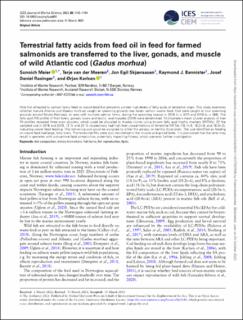| dc.contributor.author | Meier, Sonnich | |
| dc.contributor.author | van der Meeren, Terje | |
| dc.contributor.author | Skjæraasen, Jon Egil | |
| dc.contributor.author | Bannister, Raymond | |
| dc.contributor.author | Rasinger, Josef | |
| dc.contributor.author | Karlsen, Ørjan | |
| dc.date.accessioned | 2023-10-04T13:14:45Z | |
| dc.date.available | 2023-10-04T13:14:45Z | |
| dc.date.created | 2023-05-11T15:49:04Z | |
| dc.date.issued | 2023 | |
| dc.identifier.citation | ICES Journal of Marine Science. 2023, 80 (4), 1143-1154. | |
| dc.identifier.issn | 1054-3139 | |
| dc.identifier.uri | https://hdl.handle.net/11250/3094180 | |
| dc.description.abstract | Wild fish attracted to salmon farms feed on waste feed that presently contain high levels of fatty acids of terrestrial origin. This study examines whether mature Atlantic cod (Gadus morhua) caught at spawning grounds has eaten salmon waste feed. Cod were caught at four spawning grounds around Smøla (Norway), an area with multiple salmon farms, during the spawning season in 2018 (n = 327) and 2019 (n = 488). The fatty acid (FA) profile of their livers, gonads (ovary and testis), and muscles (2019) were determined. Multivariate k-mean cluster analysis of liver FA profiles revealed three main clusters, which could be allocated to trophic niches using known fatty acid trophic markers (FATMs). Of the sampled cod in 2018 and 2019, 13 % and 20 % respectively had high liver concentrations of terrestrial FATMs (18:1n-9, 18:2n-6, and 18:3n-3), indicating waste feed feeding. The remaining cod could be assigned to either the pelagic or benthic food chain. The cod identified as feeding on waste feed had large, fatty livers. The terrestrial FAs were also transferred to the muscle and gonad lipids. It is postulated that the latter may result in gametes with sub-optimal lipid composition, potentially impacting fitness, which warrants further investigation. | |
| dc.description.abstract | Terrestrial fatty acids from feed oil in feed for farmed salmonids are transferred to the liver, gonads, and muscle of wild Atlantic cod (Gadus morhua) | |
| dc.language.iso | eng | |
| dc.title | Terrestrial fatty acids from feed oil in feed for farmed salmonids are transferred to the liver, gonads, and muscle of wild Atlantic cod (Gadus morhua) | |
| dc.title.alternative | Terrestrial fatty acids from feed oil in feed for farmed salmonids are transferred to the liver, gonads, and muscle of wild Atlantic cod (Gadus morhua) | |
| dc.type | Peer reviewed | |
| dc.type | Journal article | |
| dc.description.version | publishedVersion | |
| dc.source.pagenumber | 1143-1154 | |
| dc.source.volume | 80 | |
| dc.source.journal | ICES Journal of Marine Science | |
| dc.source.issue | 4 | |
| dc.identifier.doi | 10.1093/icesjms/fsad051 | |
| dc.identifier.cristin | 2146993 | |
| dc.relation.project | Havforskningsinstituttet: 14837 | |
| dc.relation.project | Fiskeri- og havbruksnæringens forskningsfinansiering: 901230 | |
| cristin.ispublished | true | |
| cristin.fulltext | original | |
| cristin.qualitycode | 2 | |
